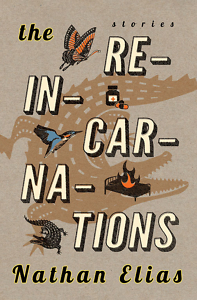Defying the Logic of Love
A debut story collection depicts magical metamorphoses in the wake of catastrophe
Nathan Elias’ debut work of fiction, The Reincarnations, is billed as a story collection but feels like a coherent whole. The 12 stories feature recurrent characters and incidents described from multiple perspectives. While the settings range south to Florida and west to California, the collection’s home is Toledo, Ohio, where most of the characters spend their youth and where, as broken adults, they limp home to lick their wounds. The title announces the central problem that winds through all of the tales: how to reinvent oneself after calamity.

These stories focus on the aftermath of catastrophe, as characters stumble in their attempts to process loss. In the opening piece, “The Alligator Theory,” a documentary filmmaker believes he has found evidence that his missing daughter, who disappeared from a park near their Tampa home, has transformed into an alligator. He knows he sounds insane – “I can’t tell what’s real anymore” – and his grip on reality loosens further when a fellow bar hound shares a Seminole legend of a child who is adopted by an alligator mother.
In “Property Damage,” a handyman named Mark stays busy renovating houses to expunge the memory of finding his fiancée naked in bed with another man. He wants to move past the fury that caused him to burn their bed in her front yard, “but ever since the incident, if I’m thinking of Lorraine, chances are I’m also thinking of fire, because that’s what she feels like inside my head.”
Some of the transformations that Elias depicts are abetted by technology that verges on the fantastical. Another parent mourning a lost child, mother Darryl in “The Al Capone Suite,” meets a scientist who has built a device that, with input of “fragments of data from people’s lives,” can “recreate a digital, interactive persona of an individual.” Elias wastes no time explaining how the automaton works, leaping instead to a scene where it begins speaking in the voice of Darryl’s dead son, explaining his suicide as the result of a broken heart. “I’m sorry, Mom,” the computer says. “I just wanted her to love me back.” “This was a bad idea,” Darryl says in response. “Turn it the hell off.”
 These ventures into alt-reality are a quarter-turn from our world, recognizable but with twists that push them to the threshold of magical realms. “Halcyon” begins as a story about a young woman, Alice, who finds peace and purpose at a California commune called the Sanctuary. When Alice disobeys the community’s rules and gets on the bad side of the leader, Juno — a two-bit guru who spouts platitudes about discovering “oneness” — she learns that the Sanctuary is not an old-fashioned cult but a mad-science project to turn unwilling subjects into human-animal chimeras. Alice learns a hard lesson with profound metaphorical implications: If you wake one morning to find that a lunatic has sewn wings on your back, your best move may be to climb a tower and fly away.
These ventures into alt-reality are a quarter-turn from our world, recognizable but with twists that push them to the threshold of magical realms. “Halcyon” begins as a story about a young woman, Alice, who finds peace and purpose at a California commune called the Sanctuary. When Alice disobeys the community’s rules and gets on the bad side of the leader, Juno — a two-bit guru who spouts platitudes about discovering “oneness” — she learns that the Sanctuary is not an old-fashioned cult but a mad-science project to turn unwilling subjects into human-animal chimeras. Alice learns a hard lesson with profound metaphorical implications: If you wake one morning to find that a lunatic has sewn wings on your back, your best move may be to climb a tower and fly away.
The Reincarnations is filled with startling images that help us make sense of the painful and outrageous in our lives — one of literature’s most important functions. Some mornings we really do feel as if we have been turned into an enormous bug; fighting for justice in an indifferent world feels exactly like charging at massive windmills with a wooden sword. Elias’ collection makes signal contributions to this repertoire of symbols. How does it feel to be separated from the woman you love? It hurts like being swallowed by a 39-foot anaconda named Roxie (“The Naga Dreams”). Falling in love for the first time makes you feel like Peter Pan and Wendy, floating over Toledo: “Flying above the Maumee River, we defied the logic of love, reinvented the laws of physics,” Elias writes in “Taking Flight.”
In “Love Drugs,” Elias, a Nashville resident, uses a marvelous pharmacological premise (“a pill that could make you stop loving someone forever”) as a counter-factual that draws our attention to the actual dynamics of love. Far from becoming “a universally synthetic experience” or a matter of “emotional convenience,” love in these tales remains natural and messy.
Though the characters in The Reincarnations often attain states of grace, Elias acknowledges that heartache can be permanent. In “Right Now at This Very Moment,” Athen tries to soothe Sylvia after her boyfriend Sam, also Athen’s best friend, dies in a car accident. With the aid of vodka and Vicodin, Sylvia reaches an altered state in which she thinks Athen has become Sam. “Oh, Sam,” she says to Athen. “It’s always been you.” Already ambivalent about masquerading as his dead friend, Athen is jerked back to reality when Sylvia emerges from her trance. “You don’t care about me. Or Sam,” she says. “You’re a goddamn liar.” Sometimes the reincarnation doesn’t happen; sometimes you’re stuck with who you are.

Sean Kinch grew up in Austin and attended Stanford. He earned a Ph.D. from the University of Texas. He now teaches English at Montgomery Bell Academy in Nashville.


